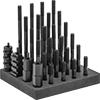Filter by
Thread Size
Fastener Strength Grade/Class
Finish
Thread Spacing
Specifications Met
Thread Direction
DFARS Specialty Metals
Thread Fit
Tensile Strength
Drive Style
Hex Nut Profile
Thread Length
Fastening and Joining
Fabricating and Machining
Material Handling
Building and Machinery Hardware



























































